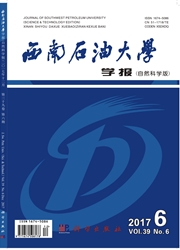

 中文摘要:
中文摘要:
针对高浓度聚驱采出液油水分离效率及其给常规交直流电场带来的冲击,开展了该类采出液的乳化行为及脱水方法研究,研究中综合了集输工况条件下的采出液转相特征、电负性、乳化油珠粒径分布、界面性质、乳化体系的微观形态及瓶试法油水分离实验,并基于所建立模拟装置评价了脉冲供电脱水对高浓度聚驱采出液破乳脱水的适应性。结果表明,高浓度聚驱采出液复杂的乳化行为与含聚浓度直接相关,含聚浓度上升使其电负性增强,转相点呈不同程度降低,且由于促进了黏弹性界面膜的形成,乳化粒子聚并和相分离的难度增大;辅以化学破乳的脉冲供电电场脱水工艺能有效改善分离效果,提高脱水操作的稳定性。
 英文摘要:
英文摘要:
Owing to the oil-water separation efficiency of produced liquid with high concentration polymer flooding and its impact on conventional AC-DC electric fields, the emulsification behavior and dehydration method of these types of emulsions were studied. Many evaluation methods were used for the gathering conditions, such as phase-inversion characteristics,electronegativity, distribution of emulsified oil-particle diameters, interface properties, micro-morphology of emulsions, andoil-water separation bottle tests. A dehydration experimental device with a pulsed power supply was established, and the adaptabilityof high concentration polymer flooding produced liquid was assessed. The results indicate that the emulsified behaviorof produced liquid in high concentration polymer flooding wells was closely related to an increase in polymer concentration.Increasing the polymer concentration enhanced the electronegativity and decreased the phase inversion points of emulsions todifferent degrees. Furthermore, difficulties of coalescence and phase separation increased because the high polymer concentration promoted the formation of a viscoelastic interfacial film. The oil-water separation effect can be improved in the dehydration process of a pulse power supply electric field with demulsifiers, and the dehydration operational stability can be perfected.
 同期刊论文项目
同期刊论文项目
 同项目期刊论文
同项目期刊论文
 期刊信息
期刊信息
